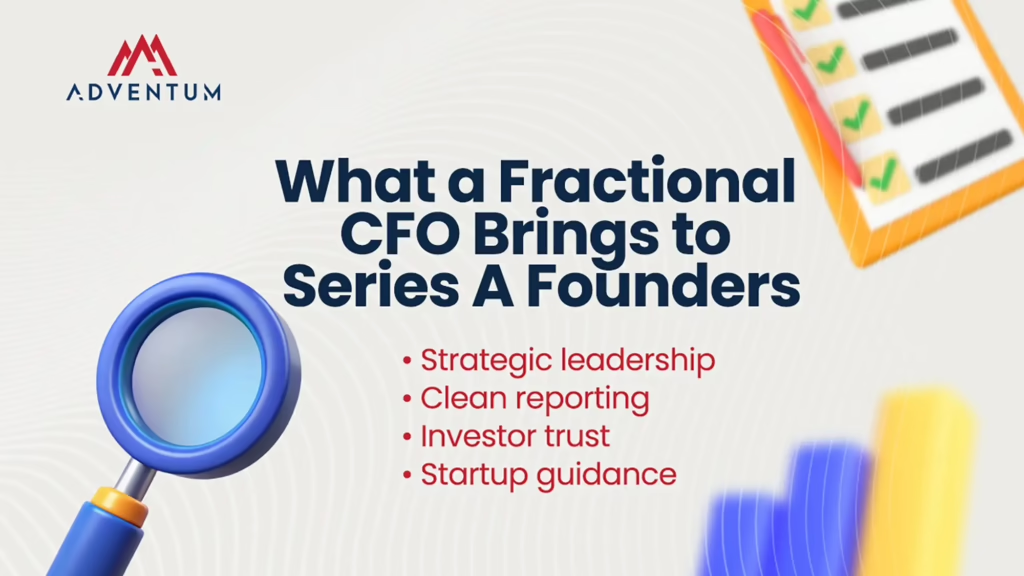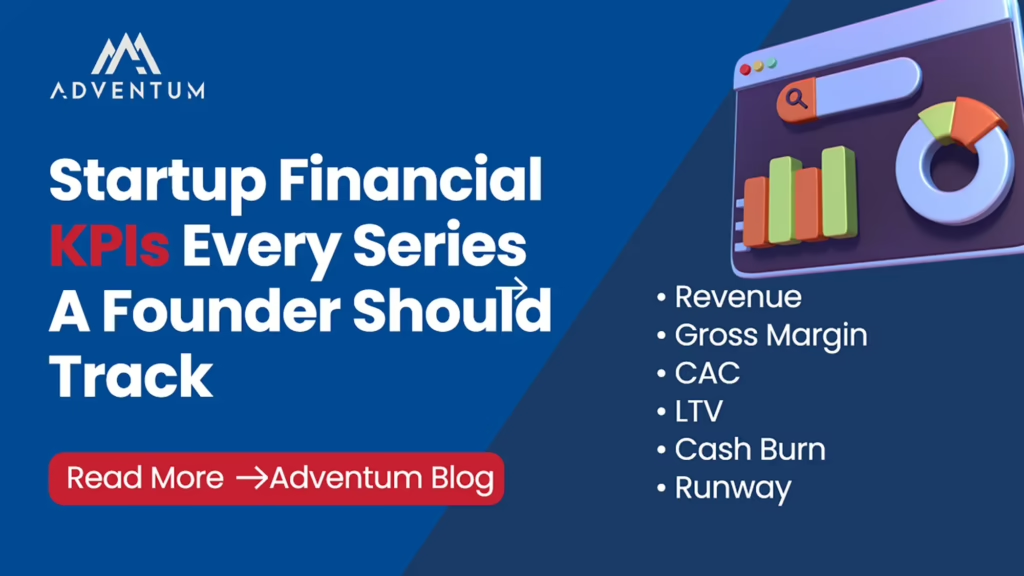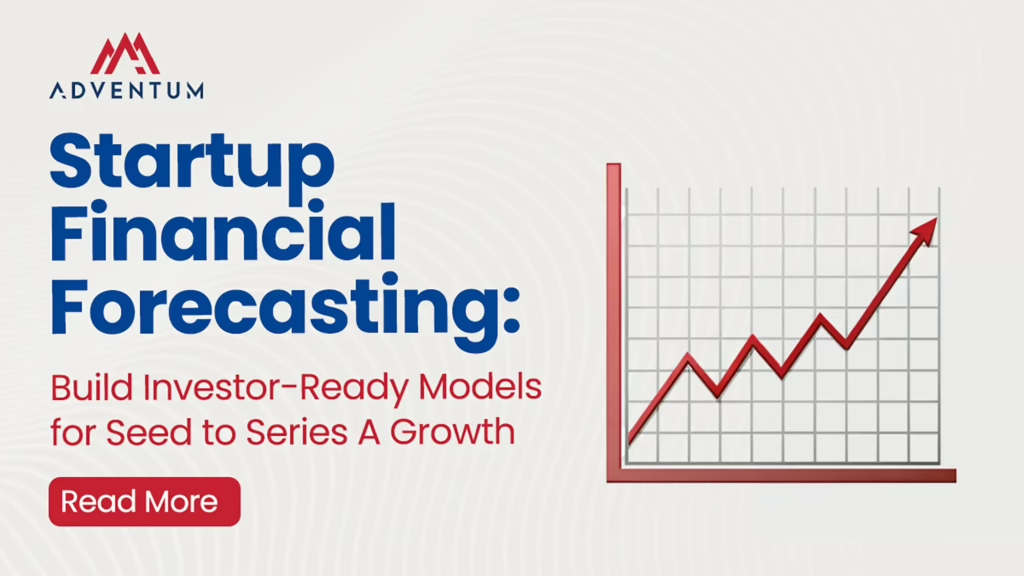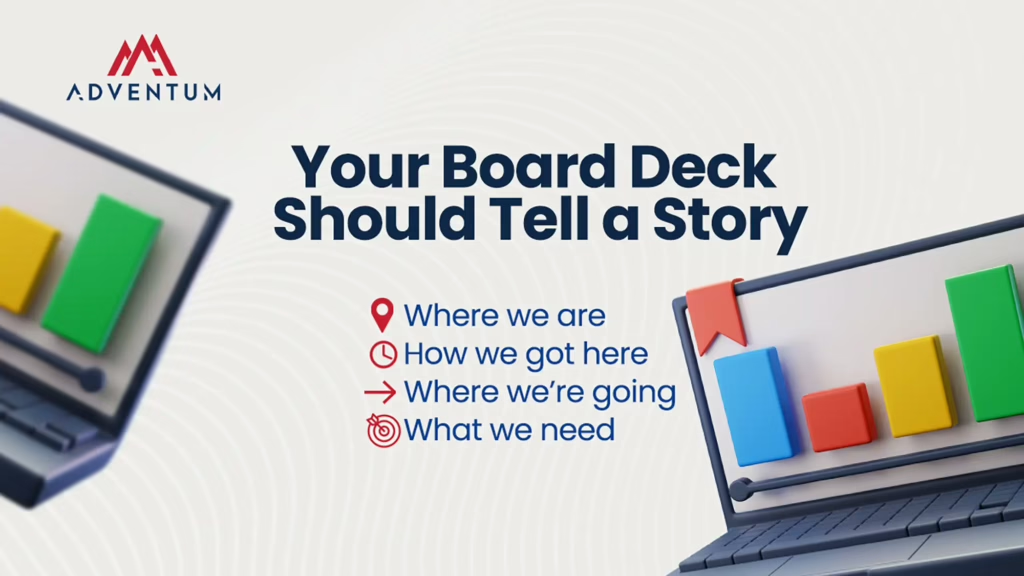Fractional CFOs help Series A founders turn investor expectations into lasting trust. From clear reporting and forecasting to confident board communication, they bring financial discipline without the full-time cost.
You probably know this, but it bears repeating:
Series A founder investor relations involve building trust and clearly communicating performance to venture capital investors.
In the early days, during pre-seed and seed stages, investors often buy into your vision, your team, and your ambition. They accept that the numbers are messy, systems are immature, and things will evolve. After Series A, though, the lens changes. Now they expect you to deliver, measure, benchmark, and communicate with discipline.
You might close the round and feel relief, but that’s just the beginning of accountability to your board, to your investors, and to your team.
This is a narrative that needs to be emphasized with founders: the most challenging part is not convincing VCs to write a check. The real test is proving that you deserve it. That means delivering against plan, managing surprises, and maintaining candor when things deviate.
One misstep: poor startup investor reporting or one-off financials can make you look opaque. That’s how trust starts to erode.
Fortunately, you don’t have to bring on a full-time CFO with a $250,000 to $300,000 annual overhead, at least not initially. A fractional CFO gives you access to senior financial leadership when you need it. They translate, systematize, coach, avoid startup traps, and help you “show up right” to investors from day one.

What Changes in Investor Expectations After Series A Funding?
Let’s get concrete. What shifts, in practice, when you move from “pre-money bet” to “post-money delivery mode”?
From Selling Vision to Delivering Numbers
Before Series A, you’re selling a possibility. You talk market size, product roadmap, team, and ambition. After the round, investors want to see the engine in action. How are you executing? What’s working? What’s not?
This means both historical and predictive data must back your stories. Vision still matters, but it must be grounded in a foundation of metrics, unit economics, margin trends, cash burn, and realistic forecasts.
Investors will expect answers to questions like:
- “What’s your gross margin going to look like as you scale?”
- “When will you break even or reach inflection points?”
- “What is the sensitivity of these metrics under downside scenarios?”
What used to be acceptable ambiguity now becomes a risk flag if you can’t explain your assumptions clearly.
The Risks of Poor Investor Relations
If you ignore this shift, you invite trouble. Some dangers include:
- Trust Erosion: If reports are late, inconsistent, or confusing, investors will question whether you’re hiding something or just operating blindly.
- Lengthier Diligence: When your next raise comes, investors will conduct more thorough diligence. A weak track record of communication makes them more skeptical and less likely to act.
- Overcorrection Risk: You may overpromise to mask gaps, then scramble to deliver or miss targets, compounding problems.
- Board Friction: Misalignment and surprise can fracture board relationships, adding friction to decisions.

To see what metrics VCs will expect you to track, check out our post Startup Financial KPIs Every Series A Founder Should Track. It’s a helpful anchor when designing your reporting systems.
How Does a Fractional CFO Strengthen Investor Relations?
So, what exactly does a fractional CFO bring to this table beyond “helping with numbers”?
Acting as the Financial Translator for Founders
Many founders are domain experts, not finance folks. A fractional CFO acts as your interpreter, helping you:
- Translate product, go-to-market, and operational metrics into financial impact.
- Frame narratives around revenue growth, margin compression, and CAC payback.
- Ask the tough questions and stress-test assumptions you may overlook.
You get someone in your corner who knows both the language of investors and the language of startup execution.
Building Investor-Ready Reporting Systems
One of the most undervalued jobs is putting order into chaos. A fractional CFO helps you build:
- Dashboards with consistent KPIs, segmented by cohort, product line, and geography.
- Maintain clean monthly close routines, including balance sheets and cash flow.
- Variance analysis (actual vs. plan) and root‑cause diagnostics.
- Scenario planning and “what-if” models.
When you produce polished, reliable reports month-to-month, investors see that you care about discipline and clarity.
Establishing Ongoing Venture Capital Communication Standards
It’s one thing to produce reports. It’s another to embed investor touchpoints into your rhythm. A fractional CFO helps you:
- Establish a cadence, such as monthly updates, quarterly deep dives, and ad-hoc updates when necessary.
- Use consistent templates so investors know where to look.
- Preemptively flag risks or deviations rather than being reactive.
- Maintain an organized “investor portal” or data room with version control, updates, and clean documentation.
This consistency sends a strong signal: you are managing intentionally, not just reacting.
What Kind of Reporting Builds Investor Trust?
Let’s zoom in on the reporting types and level of detail that matter most. These underpin your credibility.
KPIs, Cash Flow, and Runway Updates Investors Expect
Investors want you to show:
- Key unit economics, like CAC, LTV, churn, or payback windows, are broken down by cohort, market segment, or product.
- Revenue breakdowns, including new vs expansion, by region, product, or channel.
- Gross margin trends and cost of goods sold (COGS) analysis.
- Operating expenses by function or department with variance from plan.
- Cash flow statement, including operating, investing, and financing, as well as a breakdown of cash burn.
- Current runway, in months, and how much buffer vs “worst-case scenario” you’re carrying.
That’s the baseline. If you miss any of those, investors will press you hard.
Why Reliable Forecasts Matter for Credibility
Forecasts are your forward-facing credibility indicator. A few principles:
- Be transparent about assumptions. Show sensitivity analysis, including the best-case, base-case, and worst-case scenarios.
- Don’t “smooth over” bumps. It’s okay to show variability, as long as you explain why and how you’ll respond.
- Update forecasts regularly so investors see you adjusting to reality, not being stuck in stale models.
- Tie the forecast changes back to your KPIs. If your CAC changes, demonstrate its impact on cash burn, gross margin, and unit economics.
If you forecast like you believe your hype, you’ll look silly. If you forecast too conservatively all the time, you underdeliver. The sweet spot lies in striking a balance between realism and ambition.
Turning Financial Data into a Strategic Story
Numbers are inert without narrative. A fractional CFO helps turn financials into a story:
- “We saw CAC creep in Q2 because of onboarding challenges. Here’s how we pivoted and shaved 10% in Q3.”
- “Our expansion revenue is inflecting faster than expected. Here’s how that lifts free cash flow by Q5.”
- “Scenario A, B, and C: if we grow only three times vs five times, here’s what must change in cost structure to maintain runway.”
Don’t dump spreadsheets. Walk your investors through your journey. Help them see how each KPI, metric, and forecast ties back to strategy, tradeoffs, and real levers.
If you want a deep dive into forecasting and model structure, check out our blog Startup Financial Forecasting: Build Investor‑Ready Models for Seed to Series A Growth.

How Do Fractional CFOs Prepare Founders for Investor Meetings?
The meeting room is where the rubber hits the road. Here’s how fractional CFO services for startups prep founders so you stand out, not stumble.
Building Board Decks and Financial Models
A good CFO will:
- Design clean, consistent board decks that juxtapose narrative with numbers. Visuals, not dense tables.
- Build robust financial models behind the scenes that support the narrative, with scenario toggles.
- Bake in explanations, callouts, and “thought questions” into the deck so investors can follow your logic and not get lost in numbers.
Decks are not sales decks. They are performance decks. They should tell: where we are, how we got here, where we’re going, and what we need.

Anticipating Investor Questions and Concerns
Investors will probe. A fractional CFO helps you anticipate and prepare:
- What happens if revenue growth slows by 20%? What’s the contingency?
- What happens if hiring takes longer than expected?
- Which cost line can you cut if you hit a cash crunch?
- When will you need the next raise? What’s your plan for extension?
- How sensitive is the model to changes in churn, CAC, or gross margin?
By running “worst-case drills” ahead of time, you avoid getting caught off guard. Investors will also respect you more if you proactively identify and mitigate risks.
Coaching Founders to Present Numbers with Confidence
Here’s a moment fractional CFOs often coach founders: don’t defer answers, don’t speak in qualifiers, and don’t hide behind “I’ll check with finance.” Some tips:
- Practice your delivery. Know your metrics cold and be ready to reverse-engineer them on the fly.
- Use simple language. Tell the story first, then dive into the details.
- When asked a question you don’t know, it’s okay to say, “I don’t have that offhand, but here’s how we’ll get you an answer by tomorrow.”
- Bring the investor along your thought process, don’t just drop numbers. Walk through the logic.
With even modest presentation coaching, you avoid the “founder stutters when pressed on assumptions” red flag.
Why Do Strong Investor Relations Shape Future Funding?
So, why do all of these investor relations efforts matter for your next round and beyond?
Credibility Compounds Toward Series B and Beyond
Trust is cumulative. If your Series A investors feel well-informed and confident, they’ll advocate for you in their networks, co-invest in future rounds, or provide you with warm introductions. Poor relationships compound friction, requiring more diligence, increased skepticism, and more challenging requests.
Discipline now pays dividends later.
Investors as Long-Term Partners, Not Just Funders
Investors often bring more than capital. They bring introductions, domain expertise, follow-on capital, recruiting help, and network effects. When you treat them as partners, you unlock optionality.
If an investor feels blindsided, they’re less likely to help you when you need a bridge or extension.
Fractional CFOs as Scaling Allies for Growing Startups
A fractional CFO isn’t just a “bridge to full-time CFO.” They scale with you:
- Over time, they can help recruit and transition to an internal CFO.
- They align your financial operations with your business’s growth and scaling.
- They embed processes and systems to ensure a smooth transition.
- They help manage complexity, including deals, acquisitions, debt, and multi-entity setups, leveraging their experience.
In short, they’re a scaling ally.
Fractional CFOs Help Build Strong Investor Relations
Let’s wrap this up with what you should walk away with:
- Strong investor relations following a Series A round accelerate growth, tighten accountability, and smooth your path to future fundraising.
- Fractional CFOs bring clarity, discipline, and trust to your founder journey without the full-time cost burden.
- With the right partner, you won’t just deliver numbers; you’ll tell a credible financial story that draws investors in rather than pushing them away.
If you’re a founder who just closed a round, or you’re gearing up to, don’t wing your investor relations. This is too important. Adventum can step in as your fractional CFO partner, helping you build the systems, reports, decks, and confidence to build investor trust.
Let’s talk. Your credibility starts now.
Frequently Asked Questions About Investor Relations for Series A Founders
Why are investor relations important for Series A founders?
Strong investor relations build transparency, trust, and accountability—key for securing follow-on funding and long-term support.
What happens when investor relations are weak?
Poor communication or unclear financials can lead to trust erosion, board tension, and longer diligence during future raises.
How does a fractional CFO improve investor relations?
They act as a financial translator, build investor-ready reporting systems, and keep monthly close routines clean and consistent.
When should startups hire a fractional CFO?
After Series A funding, when expectations shift from vision to delivery—fractional CFOs help founders “show up right” to investors without committing to a $250K+ full-time hire.
